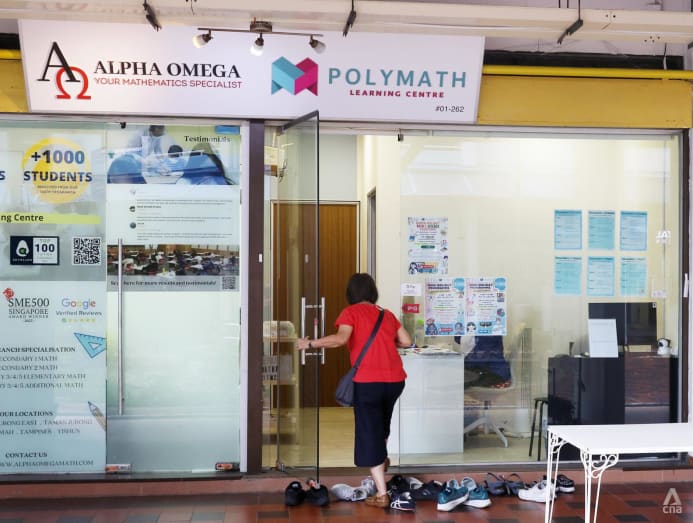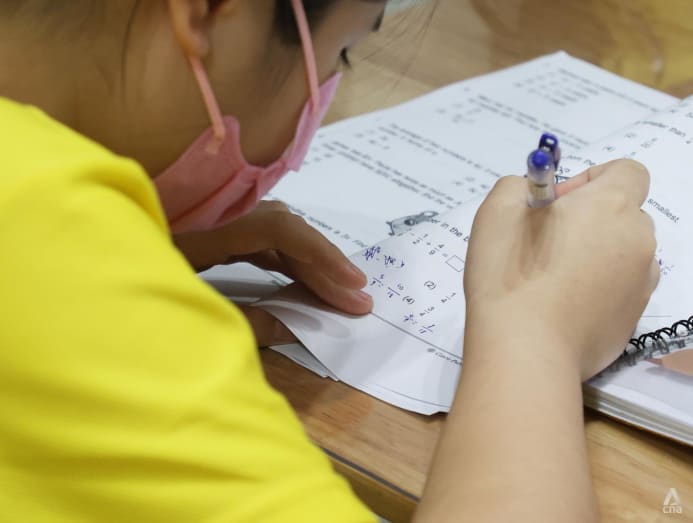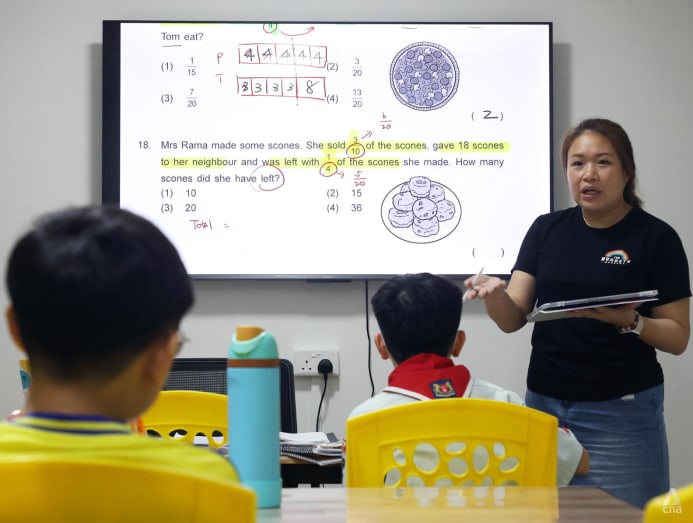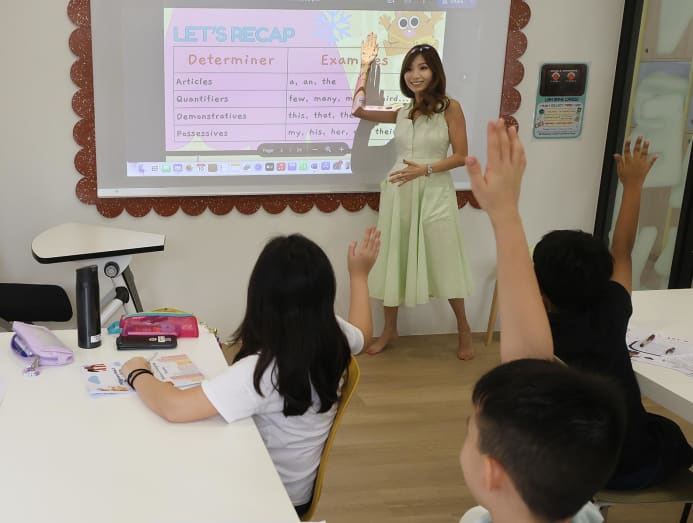Selling success or exploiting anxiety? Time to take a hard look at Singapore's tuition industry
As Singapore’s tuition industry continues to grow, some parents and educators are raising concerns over aggressive marketing tactics that play on fears of academic failure. From selective enrolment to fear-mongering advertisements, industry players and experts weigh in on the ethical debate surrounding tuition centre promotions and the push for stricter regulations.

Singapore’s tuition industry has grown significantly, with household spending rising from S$1.1 billion in 2013 to S$1.8 billion in 2023. (Illustration: CNA/Samuel Woo)

This audio is generated by an AI tool.
As a father of two running his own business, Mr Chung Zhi Kai started looking for tuition classes a year ago for his children, as he is too busy to guide them through their school work himself.
But his experience in navigating the tuition industry to look for the right classes turned out to be surprisingly unpleasant. For example, he encountered a tuition centre whose representatives tried to use, in his own words, “scare tactics” to convince him to enrol his children, now aged eight and six.
“They will say your child is very, very poor in this or that topic, making it sound like he or she is at an emergency level of need,” said Mr Chung, 36.
“I will cut off their sales pitch and tell them, ‘If my child likes the teacher, I will sign up. If my child doesn’t like the teacher, I won’t’.”
Perhaps, it helps that Mr Chung has been running his own tuition business for the past seven years, which has inevitably exposed him to various advertising and marketing tactics – some of which he finds undesirable.
“I don’t like being subjected to these. I myself don’t use such tactics,” said the co-founder of Polymath Learning Centre. His centre specialises in tuition and enrichment classes for maths and science for Primary 3 students onwards - his children are younger than that.
Other marketing strategies in the tuition industry deemed undesirable by some include limiting enrolment only to high-performing students and later taking credit for their success, paid referrals and endorsements and advertising that plays on parents’ fear of missing out, according to parents and even tuition centres who spoke to CNA TODAY.
The issue of unethical marketing practices was recently highlighted by Education Minister Chan Chun Sing during a sit-down interview with CNA, which aired earlier this month.
Mr Chan criticised these unethical promotional tactics used by the “black sheep” of the industry, and announced that the Ministry of Education (MOE) is working with the advertising industry to develop a code of conduct aimed at curbing such practices.
Parents, education industry players and experts alike welcomed the idea of such a code as a step in the right direction, given that spending on tuition has continued to rise unabated over the years. This, despite various changes made to Singapore’s education system to reduce competitiveness and overemphasis on grades.
According to the latest official figures, resident households spent S$1.8 billion (USD1.35 billion) on private tuition in 2023, up from S$1.4 billion in 2018.
Although some see the figure as a sign of the country’s over-reliance on tuition, Dr Kelvin Seah, senior lecturer from the National University of Singapore (NUS), had a more upbeat view of the situation.
He said that while tuition rates are high, as indicated by the growing spending, they could have been “even higher” had changes in the education industry “not taken place”.
“The guidelines to tackle unethical or undesirable marketing practices is likely to further blunt tuition rates, though it will likely not be a panacea,” said Dr Seah, whose field of expertise include econometrics and economics of education.

THE ‘GROWING, MORPHING’ PRIVATE TUITION INDUSTRY
Official figures show that Singapore’s overall spending on private tuition has increased over the past decade at a rate that surpasses household income growth. This is particularly striking, considering that successive student cohorts have continued to shrink due to Singapore’s declining birth rate.
The number of students enrolled in schools here from primary to pre-university levels dipped by about 10.8 per cent from 473,375 in 2013 to 422,342 in 2023.
Yet, the amount spent on tuition jumped 63.3 per cent, from S$1.1 billion to S$1.8 billion during the same period.
Meanwhile, incomes over the years have grown, but at a relatively slower pace. Average monthly household income grew 40.1 per cent in that period — from S$11,046 in 2013 to S$15,473 in 2023.
Dr Rebecca Chan, a lecturer of psychology and child and human development at the National Institute of Education (NIE), said that the surge in spending on tuition indicates a growing reliance that parents have on such services.
Associate Professor Jason Tan, also from NIE, said that the tuition industry over the decades “has not only been growing in scale, but also morphing”.
While the traditional notion of tuition is of an additional class to help struggling students, the tuition industry has grown over the years to cater even to students who are doing well but want an extra edge over others, he said.
Apart from regular tuition classes, parents and industry players noted that some centres also offer courses to help students qualify for the Gifted Education Programme (GEP) or gain entry to top schools through the Direct School Admission (DSA) scheme.
DSA was introduced in 2004 to allow students to apply to their desired schools based on their non-academic talents such as leadership, the arts and sports. However, there are also DSA tracks for academic talents, where schools take into consideration things such as a student's performance and medals in academic competitions, for instance.
GEP- and DSA-related courses at private education centres typically charge higher fees compared with regular tuition classes.
For example, one popular chain of tuition centres charges over S$900 for a package of two lessons for its GEP preparatory course, while charging less than S$150 per lesson for its regular tuition programme.
A mother of two in her 40s, who wanted to be known only as Ms Li Ling, said it is not uncommon for parents to send their children to such classes.
“After my second child got into GEP, we were chatting among parents, and quite a few of them owned up to sending their children to preparatory classes before that…and they continued to send them for tuition classes afterwards,” she said.
Ms Li Ling said she herself had refrained from sending her children to tuition classes until her eldest son almost failed Higher Chinese at the end of Secondary 2 and asked for additional help.
Education experts noted that there are many reasons some parents still choose to send their children for extra classes, even when they are not facing challenges in school.
Sometimes, it is the children themselves who are keen to deepen their knowledge in certain subjects. Or, it could be due to the parents feeling "peer pressure", seeing other families doing the same.
In other cases, it may stem from a “why not” mentality, said NIE’s Dr Chan, adding that parents who can afford to spend on boosting their child’s competitive edge at school may feel that they simply should.
The latter reason has led some Members of Parliament recently to express concerns about the gap in tuition spending between households of different income levels.
In response, Minister of State for Education Gan Siow Huang said such a development is consistent with global trends.
“Parents who are better endowed will use their resources and networks to support their children’s development. They sign their children up for more, or more expensive enrichment and tuition, hoping that this will help their children in their studies,” she said.
While MOE is “not in a position to intervene in such personal decisions”, Ms Gan highlighted that there are broad-based efforts to support children from lower-income brackets in their education, too.
For instance, there are targeted help programmes in school for students who find themselves lagging behind their peers.
Middle-income families also benefit from various broad-based support schemes and bursary amounts that have gone up over the years, she added.
Ms Gan also drew attention to heavily subsidised or free tuition programmes for low-income families outside of schools.
For instance in 2002, a Collaborative Tuition Programme was launched by the four comunity self-help groups offering such lessons. The number of centres involved in this effort has grown from 11 to 212 in 2024, benefitting over 178,000 students.

THE UGLIER SIDE OF TUITION
Amid intensifying competition for tuition dollars in a highly lucrative market, some service providers have resorted to marketing strategies which many view as either unethical or undesirable. These include:
Pre-selection and exclusion of students
A common complaint from parents and educators is that some tuition centres accept only better-performing students.
This is done by making prospective students sit for a placement test or by looking at their past school grades.
Kangaroo Learning Centre, a math tuition centre that also offers lessons for competition preparation is one such centre that conducts entrance tests.
But its founder and principal Cao Kenan, said that the centre does this to gauge the students’ learning pace and match them to the right classes.
Due to the limited capacity of his classes – it is only the centre’s third year of operation and it already has over 400 students – it is inevitable that some students will be rejected, he said.
“We don’t want to ostracise those with bad results…We do reject students based on the entrance test, but that is very few in number and we do offer retests,” he said.
But Mr Roystonn Loh, 35, who runs online tuition service The Science of Studying, said that the reality of how some centres handle their entrance tests differ from their claimed justification of matching students to the right class.
“It has been observed that students of a lower competency level may be put on a waiting list instead of being admitted immediately. The waiting time may vary, some indefinitely,” said Mr Loh, whose tuition centre does not have any prerequisites for students wishing to enrol in its courses.
Ms Sandra Lim, founder of tuition centre The Nuggets Academy, said about 50 to 60 per cent of her students are those who are "failing, borderline passing and struggling" in school. And among these, a majority of them had been rejected by or dropped out of other tuition centres.
She said that purely from a "business point of view", she understands why some centres pre-select their students: Having well-performing students in class makes the tutoring job easier, and at the end of the day the centres have "boasting rights" when a high proportion of them excel at national exams.
"But with many centres targeting these kids, I feel there are not enough centres out there who actually cater to those who really need help," said Ms Lim.

Lofty promises & fearmongering
The way tuition centres sometimes pitch their services in their advertisements has also raised more than a few eyebrows.
For example, one online advertisement shared with CNA TODAY had a script crafted to tug at students' anxieties.
In the video ad, the centre owner tells viewers that there can only be two outcomes after examinations: With a student either “feeling down in the dumps” or “all rainbows and butterflies”. The ad goes on to say that it is “up to you” to decide on the outcome, before introducing limited-time discounts for its classes.
Ms Li Ling, whose two children are now in schools offering the Integrated Programme, recalled seeing advertisements telling parents to sign up their kids for tuition because “PSLE maths is getting harder and harder”.
“But when I spoke to teachers, they said that it was in fact untrue. So such centres are just making parents more anxious,” she said.
Ms Lim from The Nuggets Academy said she understands the sense of urgency that some tutoring ads adopt, because educators do not want parents to leave their struggling children unaided only to enrol their kids in tuition at the last minute and expect results.
Leaving a child alone to struggle by themselves for a long period without help may also affect his or her overall self-confidence and interest in learning, she added.
But there are always better ways to send this message across, like emphasising how timely help can benefit struggling students and showcasing the tuition centre's teaching approach, she said.
There were also centres that flaunted results which some parents found hard to believe.
“I recall this tuition centre boasting 70 per cent of their students scored AL1, with the remainder scoring AL2,” said Mr Chung of Polymath, referring to the highest two bands in the Primary School Leaving Examination (PSLE) scoring system.
He added that the centre was either exaggerating its track record, or preselecting its students, as it was unlikely that such a high proportion of its students could score in the top two out of eight bands in the national exam.
Monetary incentives & referrals
One practice that elicits mixed reactions from parents and industry players is referral programmes, where parents or students receive incentives to promote the centre to others.
Some centres justify the approach – which typically awards a small discount on tuition fees to the referrer – as a token of appreciation.
But with the referrer benefiting from the arrangement, some question the authenticity of such recommendations, especially since parents often take into account the endorsements of people they know.
Dr Deep Datta-Ray, a university academic, sends his eight-year-old son to Chinese tuition because he is doing Chinese as Mother Tongue, a subject neither he nor his wife, both of Indian ethnicity, are able to teach.
“A Chinese friend's child was already at the centre, so we learnt about it from them,” said Dr Datta-Ray, when asked how they chose a tuition class for their son.
While he did not check whether the referral from the friend was incentivised or otherwise, he said his impression of the centre would not have been affected either way as it is a common practice in the industry.
But other parents took issue with how incentives are rolled out and the amounts involved.
A woman in her 40s, who wanted to be known only as Mrs Tan, said that she knows of some tuition and enrichment centres that incentivise bright students to enrol with them by offering free tuition for a certain period.
“Giving free tuition to already bright kids and then using them as adverts is misleading and just not right” said Mrs Tan, who has a daughter in primary school.
Mr Cao of Kangaroo Learning Centre said while his centre relies mainly on word-of-mouth to grow its business, he does not offer any incentives for referrals.
"If there are no benefits and yet parents still recommend the tuition centre, it shows that the referral is genuine because there is no reward behind it," he added.
Some tuition centre operators who spoke to CNA TODAY pointed out that there are always other ways to stand out in a crowded market without resorting to such questionable tactics.
Mrs Lily Chew, a mother of four and founder of English tuition centre Lil’ but Mighty, said that her small company occasionally partners with external agencies to come up with marketing plans.
“We have come across marketing agencies who are pretty aggressive in the way that they may word certain messages, as well as the approach that they have to help you to stand out,” she said, adding that this was not in line with the centre’s own values.
When the agency and her centre cannot come to an agreement on such matters, she would end the partnership, Mrs Chew said.
Ms Umah Devi, manager for the diploma in business management course at Nanyang Polytechnic, said that increased competition in the tuition industry could have pushed some tuition centre operators to adopt a “win-at-all-costs mentality” and turn to questionable marketing tactics.
By extension, such pressures may also motivate marketing agencies that are advising the centres to adopt aggressive tactics, in hopes of delivering “quick and impressive results to their (tuition centre) clients”, she added.
Meanwhile, some tuition centres also market their services in other ways, rather than just relying on advertising.
Lil’ but Mighty and Polymath, for instance, make available some of their resources online so that even students who are not enrolled at their centres can have a glimpse of their teaching methods. Those who find these resources helpful may then be drawn to attend trial classes and potentially become enrolled students.
Learning Journey Education Centre, an English language centre, publishes its own assessment books that are sold at major bookstores.
Its founder, Ms Grace Tan, said her centre is launching an artificial intelligence-assisted platform that helps students practise for their PSLE oral examination.
The platform will be made available publicly, as part of the centre’s efforts to reach out to new clients.

BLANKET BAN ON ADS NOT THE WAY
Although no details have been announced yet about the proposed advertising code of conduct for the tuition industry, educators and parents unanimously agreed that it was a step in the right direction.
CNA had earlier reported that the education ministry met with the Advertising Standards Authority of Singapore to discuss advertising self-regulation and considerations behind potential sector-specific guidelines.
“The fact that the minister has initiated this already makes the tuition industry players be more mindful of the potential impact of how their advertising is being done,” said Mrs Chew of Lil’ but Mighty.
One major issue that the code of conduct needs to address is transparency, said parents and industry players.
For instance, they suggest that tuition centres which publish their students’ results and testimonials should be able to prove that these are genuine and accurate.
Mr Chung suggested that authorities conduct spot-check audits or launch a channel for parents to submit feedback on any form of suspicious advertising.
“The fact that there’s an ‘invitation’ for the public to give feedback on what they suspect are errant practices, will help keep the centres in line,” he added.
Nonetheless, the industry players noted that subjective and creative output such as advertising materials involve a lot of nuances. Thus, it may be difficult for the code of conduct to list out a comprehensive list of dos and don'ts.
And all cautioned against a hard ban on advertisements.
Ms Tan of Learning Journey Education Centre said centres should be allowed to display testimonials and students’ results to show their track record, but do it in a manner that is responsible and does not fuel anxiety among parents.
Mr Tong Hong Mun, founder of tuition and enrichment centre The Math Classroom, said that a sudden, hard ban may nudge tuition centres to move their ads and marketing practices to “less visible channels, thereby persisting in their violations”.
These could include niche messaging apps and chat groups, as opposed to easily observable media like paid online advertisements or physical posters in public spaces.
Dr Ho Boon Tiong, principal consultant educationist at training and consulting firm ClassPoint Consulting, said that sufficient engagement with industry players and stakeholders before introducing the code of conduct would be helpful in two ways.
First, it can help iron out details and address any concerns that tuition centres may have, making compliance easier when the code is implemented.
Second, such engagement sessions could serve as a useful way for authorities to reinforce the intent behind the guidelines and ensure that tuition centers align with the spirit, not just the letter, of the code.
CHANGES TO THE EDUCATION SYSTEM
Disruptions and changes to the education system – by design or otherwise – seemed to have done little to tamper the demand for private tuition, with centres adapting to capitalise on such changes.
In recent years, the education ministry has frequently emphasised that there are multiple pathways to success beyond academic grades, in a bid to recognise that some students are talented in different areas of life, such as sports, music or the arts.
But instead of taking this as an indication that they should not be so anxious about their child's grades, some parents are seeing these multiple pathways as “additional hurdles to success”, in that their children now have to display excellence in multiple tracks of success beyond academics, said Assoc Prof Tan from NIE.
As a result, certain tuition centres have also begun offering courses that specifically boost students’ chances of success outside the main examinations, like providing preparatory courses for the DSA scheme.
In 2018, when MOE announced that it was going to reduce the number of examinations for students in primary and secondary schools, the tuition industry quickly responded with mock examinations, to fill the “gap” and meet parents’ demand.
This prompted Mr Ong Ye Kung, then-minister for education, to urge tuition centres not to "undo the work" to reduce students’ stress and an emphasis on grades.
MOE has also repeated over the years that it takes more than just policy tweaks to change society’s attitude on, and relationship with, tuition.
“Our reforms will take time to bear fruit. Reducing the over-reliance on private tuition requires not just policy shifts, but a long-term partnership between MOE, parents and the wider community to change mindsets,” said Ms Gan in Parliament earlier this month.
EDUCATION A ‘HIGH STAKES’ GAME
While a new advertising code of conduct may weed out the “black sheep” in the tuition industry, it is unlikely to affect the much bigger picture – Singaporean students’ heavy reliance on tuition.
After all, tuition advertising is just a tiny part of that picture.
As Mr Loh, the owner of The Science of Study, put it, to think that parents can be easily triggered into taking action by guilt-tripping ads “very much underestimates how savvy parents are these days”.
“Parents nowadays are not looking at an ad and going ‘Oh! They have students that scored AL1 for all subjects so they must be good!’” he said.
Sociologist Tan Ern Ser added that how parents choose to react to marketing ploys is as important as how the advertising materials are being crafted.
"If parents are discerning and not blindly purchasing any 'snake oil' sold to them, while having reasonable expectations of their children... then they would be able to see unethical marketing practices for what they are: Unethical, unnecessary, even harmful," said Dr Tan, who is adjunct principal research fellow and academic adviser at the Institute of Policy Studies (IPS) Social Lab.
Indeed, several parents who send their children for tuition told CNA TODAY that many factors — such as cost, convenience, pace of lesson and the suitability of the tutors’ teaching style — are taken into consideration before they enrol their children; their own initial reactions to an ad or marketing stunt notwithstanding.
From a broader perspective, the demand for private tuition classes and the potential of overreliance on it are issues that many other countries are grappling with too, albeit in different forms.
The Economist magazine reported last September that demand for such services is booming in Asia as poorer parts of the region grow in affluence and parents become caught up in "an arms-race dynamic" of not wanting their children be left behind when they see others enrolling private tutors.
South Korea and China tried taking the drastic measure of outlawing private tuition in a bid to reduce academic pressures on students and financial burdens on families. The ban in 1980 was overturned in South Korea in 2000, while in China the industry merely went underground after the 2021 clampdown.
Underlying this global trend is essentially parents’ desire to do their best to help their children succeed in life, said experts.
“Parents’ fears and anxieties are already there when their child is born,” said Dr Chan of NIE.
She added that the more important question is how to allay parents’ concerns, rather than “blaming” certain types of advertisements for exploiting their sentiments.
Agreeing, Assoc Prof Tan from NIE said that on the one hand, success in life has been so closely linked to grades for so long that this mindset will take a long time to shift.
“Why is it difficult to dislodge? Because we are talking about high stakes – we're talking about children's futures, about parents’ dreams and hopes and aspirations for their children,” he added.
Coupled with all these are the growing societal expectations for parents to be more active in supporting their children’s education, he added.
“And if you (parents) think you’re unable to, for whatever reasons, where does that leave you? You ‘outsource’ to tuition,” Assoc Prof Tan said.
Agreeing, Mr Loh, the parent who has his own online tuition service, said: “I have had conversations with my child’s teachers in Primary 1 where the teacher explicitly said: ‘Your child is not following the lessons well. You should get tuition classes for her’.”
“Mind you, we are not the only parents; my child’s classmates’ parents have also received calls and have had similar conversations with the teachers,” he told CNA TODAY.
While many parents succumb to the pressures to send their children to tuition, one mother of four, Ms Jaslyn Tan, is trying her best to buck the trend.
The 45-year-old told CNA TODAY that she has heard “too many stories” of children stressing themselves out over academics and their parents comparing their examination results with that of other children's.
“Being kiasu is a very Singaporean thing… that we often laugh off, but if this character is really built within my kids, I honestly do not want it,” she said, using the Singaporean slang referring to a fear of missing out.
Having worked as a human resource professional for years, Ms Tan has seen how job candidates with stellar academic backgrounds may not necessarily turn out to be the best workers. This has further reinforced her belief not to be too hung up on grades while raising her four children, aged eight to 13.
She has thus never sent them for any tuition classes. Instead, she relies on online study resources, provided by the children's school and external providers, for her kids to work on.
“I’ve seen tuition ads and to be honest many times I wanted to give in for my twin boy who was struggling,” she said.
But in those times, it was her husband who reminded her of their parenting ethos, which is to balance character-building and academics, she said.
“I know my kids and I don’t want to stress them. As long as they pass their exams, it's fine. If they fail a subject, we sit down and look through the questions and see what happened, then we help them and work on it together."
ADDITIONAL REPORTING BY NICOLE LAM.









